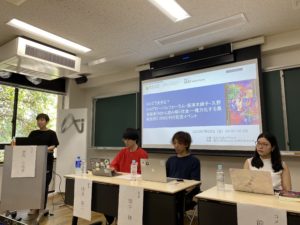2023.Sep.22
REPORTSReport on “How to live with AI? “AI kara yomitoku shakai: kenryokuka suru saishin gijutsu (Understanding AI in Society: How Technology Exerts Power)” (2023) Book Launch Event”
Yui Kondo(School of Political Science and Economics, Waseda University)
・Date: July 28, 2023 (Fri), 2:00~4:00 pm (JST)
・Venue: On-site & Online Hybrid
・Language: Japanese
・Speakers: Yuji Hatada(Assistant Professor, Interfaculty Initiative in Information Studies, The University of Tokyo)
Akira Tanaka(Assistant Professor, Graduate School of Design, Kyushu University)
Haruka Maeda(Project Researcher, Graduate School of Law, Kyoto University)
Reina Saijo(Assistant Professor, Faculty of Engineering, Tokyo Denki University)
・Moderator: Kyoko Takeuchi(Project Assistant Professor, Interfaculty Initiative in Information Studies, The University of Tokyo)
・Organizer: B’AI Global Forum, Institute for AI and Beyond, The University of Tokyo
・Supported by: The Institute for AI and Beyond, The University of Tokyo
(Click here for details on the event)

On July 28, 2023, the B’AI Global Forum convened a special event in celebration of the release of the book “AI kara yomitoku shakai: kenryokuka suru saishin gijutsu (Understanding AI in Society: How Technology Exerts Power)” (2023), which was edited by Yuko Itatsu, Ai Hisano, and the B’AI Global Forum. Following the introductory remarks by the editors, the event featured presentations by key contributors: Yuji Hatada, Assistant Professor at the Interfaculty Initiative in Information Studies at the University of Tokyo (Chapter 2), and Akira Tanaka, Assistant Professor at the Graduate School of Design at Kyushu University (Chapter 6). Additionally, Haruka Maeda, Project Researcher at the Graduate School of Law at Kyoto University, and Reina Saijo, Assistant Professor at the Faculty of Engineering at Tokyo Denki University, were invited to engage in discussions concerning the ascendancy of AI in contemporary society and its profound implications.
To commence the event, Hatada delivered an enlightening presentation on the dynamics of power within VR technology. He elucidated how the metaverse functions as a platform that governs existence and actions, underscoring its capacity to influence users’ lives and rights through its design. He underscored the presence of distinct rules and information ecosystems in the metaverse, distinct from the real world, wherein power structures take shape. Additionally, he raised the issue of constructing identities through avatars, noting the potential for these constructs to reinforce and perpetuate stereotypes. Hatada also explored the disparities in sensory stimulation between VR and reality, emphasizing the significance of comprehending how media-generated realities may deviate from individuals’ cognitive expectations.
Subsequently, Tanaka gave a presentation entitled “Toward Democratic Coexistence with AI,” wherein he expounded upon the intricate interplay between democratic principles and artificial intelligence. He advocated for democratization in the design and utilization of AI, acknowledging that while democracy presupposes human subjectivity, wherein everyone is afforded the freedom to actively contribute to opinion formation and decision-making, AI, powered by machine learning, endeavors to emulate human-like sensibilities, previously deemed unattainable for machines. Tanaka emphasized the critical importance of deconstructing and harnessing power structures and introduced an analytical framework distinguishing between subjectification through discourse and objectification through environmental architecture. He underscored the significance of democratizing AI’s design and usage and urged a reevaluation of situations where opinions are only solicited during elections, advocating for what is known as radical democracy.
During Maeda’s commentary, she highlighted the distinctive aspects of the book: a focus on power dynamics, an emphasis on interpersonal relationships, and an exploration of specific domains. She noted that the book not only delves into the power dynamics among human AI designers but also introduces a relational perspective in which AI and humans reevaluate their connection. Maeda emphasized the importance of recognizing the collaborative relationship between humans and AI. Furthermore, she emphasized that the harm resulting from misrecognition or misidentification is context-dependent, necessitating consideration of various actors within specific contexts.
In Saijo’s commentary, the book’s third chapter, “Visualizing Developmental Disorders with AI,” and the fifteenth chapter, “Let’s Draw AI!: A Workshop to Foster Metaphorical Understanding of Media,” were the focal points. Saijo commended the portrayal of how perceptual simulators, which visualize sensory hypersensitivity and hyposensitivity in individuals with autism spectrum disorders (ASD), have a positive impact on the design of inclusive societies. She also praised the forward-thinking and democratic approach of workshops that engage diverse participants in envisioning AI’s role. However, Saijo pointed out the importance of considering not only cisgender women but also transgender men and non-binary individuals who experience pregnancy, abortion, and childbirth when discussing reproductive health.
The event culminated in a dynamic panel discussion addressing various topics, including non-immersive device challenges, multiple avatar logins, AI copyright and attribution discussions, communication hurdles in metaverses and social VR, and deliberations on the democratic decision-making processes and equitable technical explanations for AI technology. In light of the burgeoning reality of an AI-driven society, this event offered multifaceted perspectives on how individuals and society should engage with AI, providing valuable insights into the future of AI and its relationship with society.